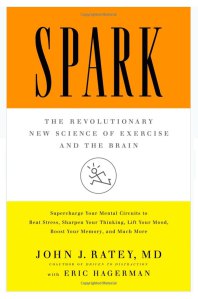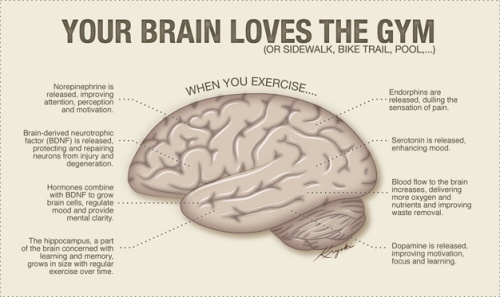I wrote Exercise, Aging and the Brain back in September 2011. The first sentence reads, “Just a year of modest aerobic exercise reversed normal brain shrinkage by one to two years in older adults and improved their memory function, according to an article in today’s Wall Street Journal.”
Because I have a family history of Alzheimer’s and dementia, I am acutely aware of my own brain’s vulnerability, so the Wall Street Journal piece reassured me and also spurred me to investigate how the brain benefits from exercise. You can check out my Page – Important Facts About Your Brain (and Exercise Benefits) to read more posts on the subject.
So, you can imagine my excitement to learn that the Chicago Tribune had picked up on the concept, too. My brother, Mike, also a senior citizen, called to alert me about the article – The Best Brain Exercise May be Physical by Julie Deardorff, a certified personal trainer and writer for Northwestern University, where I taught journalism some years ago.
I liked the fact that Deardorff expanded the concept of exercise aiding the brain all the way to infancy. “Babies, for example, need regular movement to carve out critical pathways and form connections in the brain. In children, research suggests exercise improves attention, focus and academic performance.”
My focus had been on the aging brain, but it is gratifying to learn that the principle starts in the crib.
“Scientists used to believe the mind-body connection was a one-way street: The brain helped build a better physique — or else it sabotaged attempts to get to the gym. But scores of studies suggest that what’s good for the body also is nurturing the old noodle. Exercise, it turns out, can help improve cognition in ways that differ from mental brain-training games,” the Tribune piece continued.
Yes, about those brain games. In April 2011 I wrote Exercise, Not Just Sudoku for Seniors. “Unless the activities that you’re practicing span a broad spectrum of abilities, then there is not a proven general benefit to these mental fitness programs. So, the idea that any single brain exercise program late in life can act as a quick fix for general mental function is almost entirely faith-based,” Professor Wang said in our post on physical exercise vs mental exercise.”
So, seniors who are doing crosswords and sudoku puzzles to keep their brains active would be far better off taking a walk or indulging in other physical exercise that will send some oxygen up to their brains and create new neurotransmitters.
The Tribune piece concludes, “Sadly, the hippocampus naturally shrinks in late adulthood, leading to impaired memory and increased risk for dementia….
“”Atrophy of the hippocampus in later life is generally considered inevitable,” said Kirk Erickson, professor of psychology at the University of Pittsburgh. “But we’ve shown that even moderate exercise for one year can increase the size of that structure. The brain at that stage remains modifiable.””
I would like to conclude with some quotes from my post of May 2011 Exercise Has Real Benefits for the Brain.
“The brain has similar needs to other organs. It needs glucose, oxygen and other nutrients. There are very real concrete benefits to exercising that directly affect the brain.
“I like to say that exercise is like taking a little Prozac or a little Ritalin at just the right moment,” says John J. Ratey, MD, an associate professor of psychiatry at Harvard Medical School and author of A User’s Guide to the Brain.
“Exercise is really for the brain, not the body. It affects mood, vitality, alertness, and feelings of well-being” according to WebMD.
Dr. John Ratey also wrote the Book Spark – The Revolutonary New Science of Exercise and the Brain which you can check out at this Amazon link.
So, as I have said so many times on these pages, eat less/move more/live longer. You are likely to be doing it with your mental faculties intact, too.
Tony








